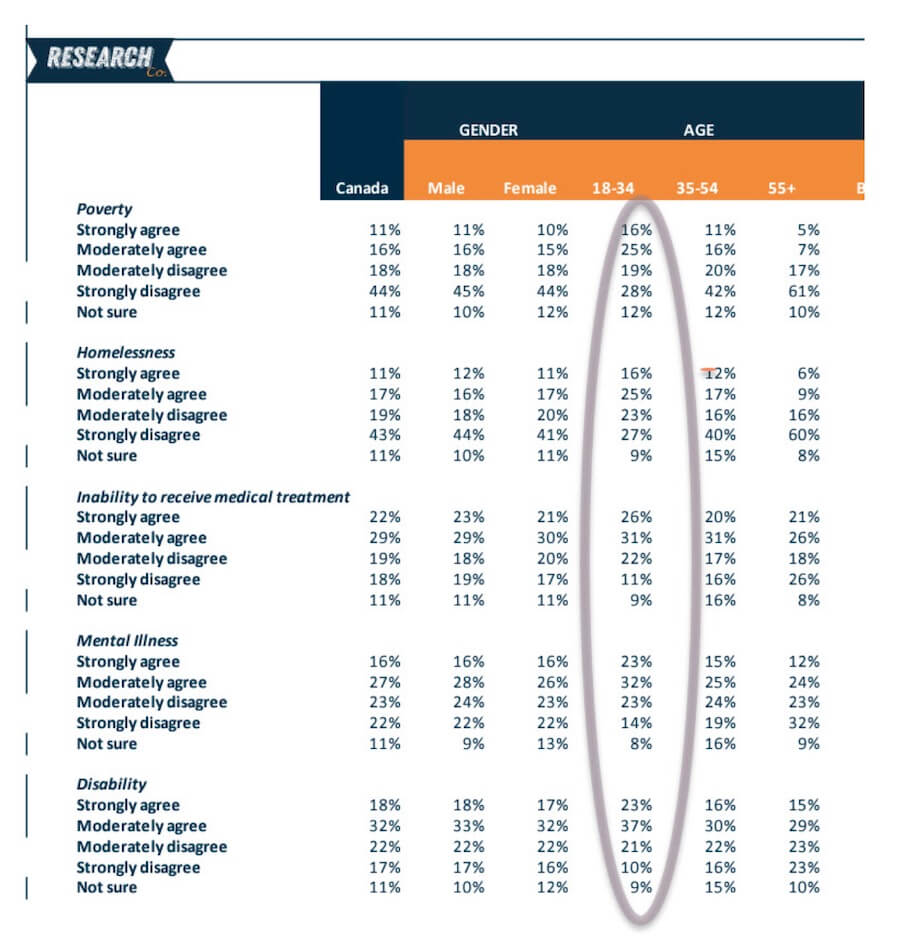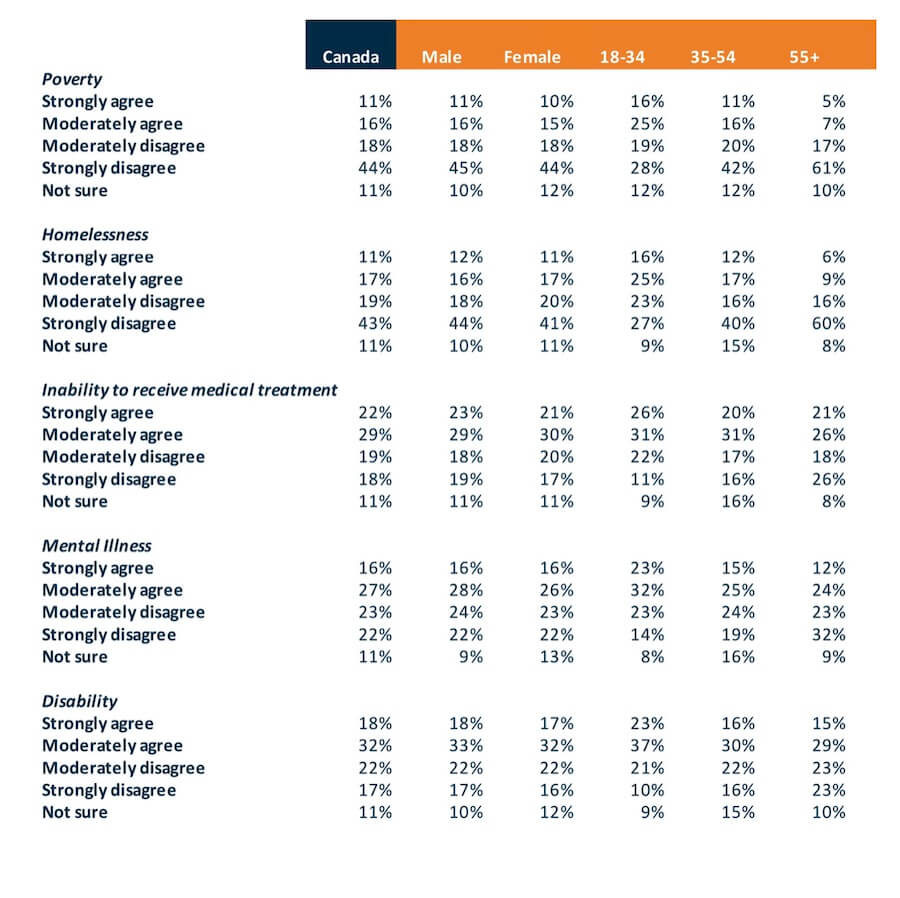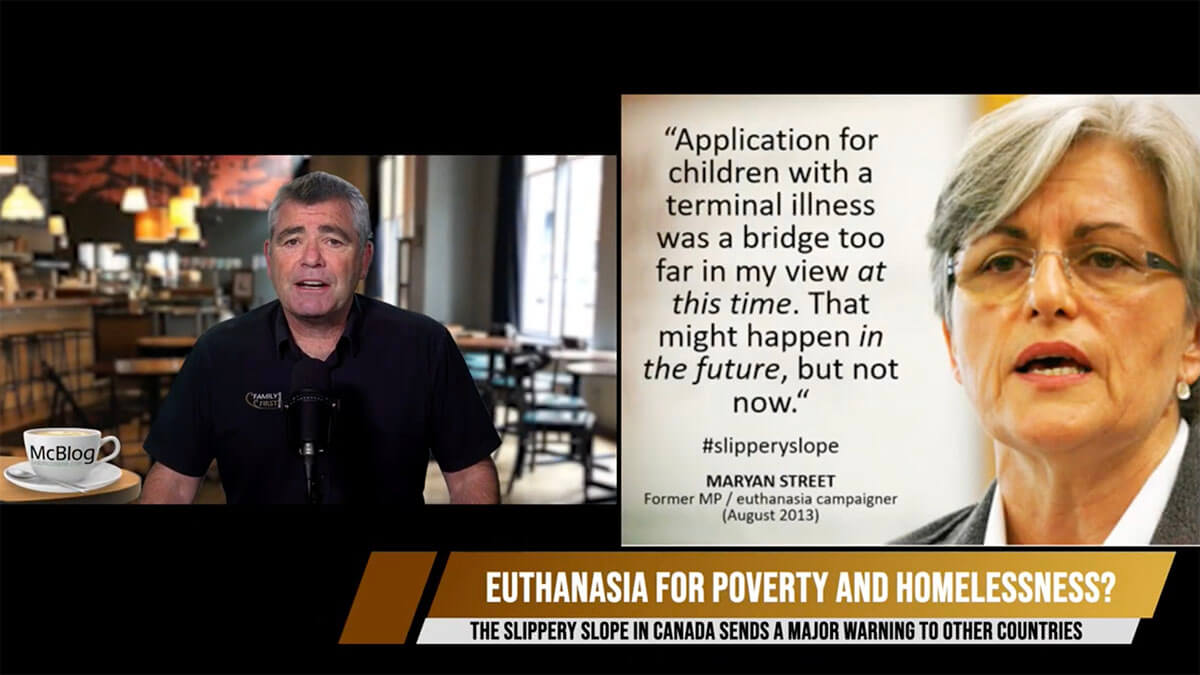Euthanasia for homelessness and poverty?!
Euthanasia for poverty & homelessness soon (Canada)?
The requirements to seek assisted suicide, sometimes called medical assistance in dying, have been relaxed in Canada over the past several years. The practice is currently available only for adults with severe medical conditions but the criteria will soon expand to include people with mental illness. In February, a Canadian parliamentary committee recommended that “mature minors” be allowed to seek assisted suicide even without parental consent.
Sadly this slippery slope will continue. When a newly-permitted activity is characterised as a ‘human right’, the overseas experience is that there is an inevitable push to extend such a ‘right’ to a greater number of people, such as those with chronic conditions, disabilities, mental illness, those simply ‘tired of life’, or even children.
Even Maryann Street alluded to this when the debate first started in New Zealand.
And there’s new polling data from Canada which shows exactly why this slippery slope may occur
At the beginning of May, a new Research Co. poll was published in Canada on their attitudes to euthanasia.
In the online survey of a representative national sample, (previous poll conducted in January 2021)
Almost half of Canadians (48%, +5) are satisfied with the regulations that are currently in place in the country to manage the issue of medical assistance in dying, while 27% (+1) are dissatisfied and 25% (-6) are undecided.
At this point, only an adult with a grievous and irremediable medical condition can seek medical assistance in dying in Canada. Bill C-7 passed in March 2021 eliminated the requirement that people must be terminally ill to die by euthanasia.
Originally Bill C-7 excluded euthanasia for mental illness. But the Senate passed an amendment to the bill to require euthanasia for mental illness and the government accepted the amendment but with a two-year moratorium for implementation. That will be March 2024.
Respondents were asked if people should be able to seek medical assistance in dying because of five different reasons.
Half of Canadians – which seems to be the half of Canada that loves all aspects of euthanasia – would agree to allow adults in Canada to seek medical assistance in dying due to an inability to receive medical treatment (51%) or a disability (50%).
Canadians are split when pondering if mental illness should be a justification for an adult to seek medical assistance in dying: 43% support this idea, while 45% are opposed. Yet the canadian Government seem to be pushing ahead on this one.
But then there’s a bit less support for other categories. Fewer than three-in-ten would consent to expand the guidelines to include homelessness (28%) or poverty (27%) as reasons to seek medical assistance in dying. It’s shocking to think that homelessness and poverty would ever be justified as a reason for allowing someone to kill themselves.
But if you look at the age breakdown of the figures you found a disturbing trend –

In terms of the 27% of people who think you should be able to be euthanised because you are experiencing poverty, 41% of 18-34 year olds supported this.
28% of people supported euthanasia for homelessness but that same 41% of 18-14 year olds supported this. Homelessness.
43% supported euthanasia for mental illness but more than half – 54% – of 18-34 year olds supported this). Remember – The federal government recently passed legislation which will allow euthanasia for mental illness starting in March 2024.
50% supported euthanasia for disability – 60% of 18-34 year olds supported this.
Those results in the 18-34 year old demographic paint a particularly concerning picture about Canada’s future, and the societal harms of euthanasia legalisation in general.
In February, a Canadian parliamentary committee recommended that “mature minors” be allowed to seek assisted suicide even without parental consent.
A funeral home in Quebec is offering space for medical assistance in dying, which the company says fills a gap in services. As the number of people choosing this option increases, there are concerns about businesses profiting from the practice. (May 20 2023)
And an Instagram influencer made a ‘positive’ video about euthanasia.
‘Are you excited to die?’ she asks her grandmother.
https://www.eviemagazine.com/post/influencer-posts-grandmas-medically-assisted-suicide-claims-humane-choice
She received much backlash after making a cutesy video about taking her grandma out to her last dinner before her doctors assisted her to commit suicide. It all started when she posted a video of herself dressing up for her last dinner with her grandma. “My grandmother has chosen Euthanasia for her terminal diagnosis, so this is the last time I can take her out to dinner,” she wrote. The video got more than 11 million views on TikTok. From there, she started posting multiple videos about her grandma’s choice for MAiD.
Then she started posting videos featuring her grandmother discussing her choice of euthanasia. She is terminally ill and wants to be in control of her death. She says you receive one initial injection that just puts you to sleep, followed by two other injections that eventually end your life. “It’s painless,” the grandmother says. She said she’d prefer to do this at the hospital rather than at home and she looks forward to being in charge of the way she leaves this world. Her husband has already died, so she envisions seeing him in the afterlife. There was much backlash about the way that she used her grandmother’s suicide to gain followers, clicks, and views for her social media. But she claimed that she just wanted to raise awareness about MAiD and discuss it. She disagreed with the notion that MAiD suicide shouldn’t be celebrated, claiming that suicide is only considered wrong because of Judeo-Christian values
Um…. Despite the fact that many non-christians & medical professionals and medical bodies also oppose euthanasia
You can see how this is all normalising euthanasia.
Oh here’s one other example – The Medical Assistance in Dying (MAID) Activity Book was first published last July by the group Canadian Virtual Hospice. It was financed by Health Canada – the government. And of course while there is ongoing debate about euthanising minors. No connection?
The target audience is children aged between 6 and 12. The booklet is “Medical Assistance in Dying (MAiD) Activity Book” and the cover reads: “Welcome! These activities will help you think about Medical Assistance in Dying by someone in your life.”
Here, for example, is how the book describes MAiD:
The word ‘medical’ means the science of medicine, and ‘assistance’ means help. So MAiD means that medicine is used to help someone with their death. A doctor or nurse practitioner (a nurse with special training) uses medicines to stop the person’s body from working. When their body stops working, the person dies. This is done in a way that does not hurt the person. The medicines help them feel comfortable and peaceful. A person has to ask for MAiD and then go through a bunch of steps before it can happen. The steps are described below in this book.
For those 18 years old or older, the book says, MAiD can be requested if they have “a serious illness, disease, or disability that hurts their body or mind so much that it feels too hard to keep on living.” On page two already, they are justifying suicide for those with mental illness or disabilities.
On page five, the booklet reiterates that some people with disabilities will opt for suicide because they cannot make their disabilities go away. The message here is crystal clear. Throughout the booklet, the word “disability” is paired with “illness” when talking about MAiD (“disability” is used in that context 12 times.) According to this children’s resource, if you have a disability, you may be justified in feeling that your life is not worth living.
Unfortunately Canada, Australia, are Belgium are amongst some countries that have broken ground first – and now NZ is sliding down this slope.
David Seymour has already indicated that there’s worse to come. He wants the law expanded
Euthanasia and assisted suicide put many of us in danger. Nothing in new law guarantees the protection required for vulnerable people, including the disabled, elderly, depressed or anxious, and those who feel themselves to be a burden or who are under financial pressure. The international evidence backs up these concerns, and explains why so few countries have made any changes to the law around this issue.
But we can live without euthanasia. We need to speak up. We need to protect our most vulnerable.
Methodology: Results are based on an online study conducted from April 22 to April 24, 2023, among 1,000 adults in Canada. The data has been statistically weighted according to Canadian census figures for age, gender and region. The margin of error, which measures sample variability, is +/- 3.1 percentage points, nineteen times out of twenty.
Find our data tables here and download the press release here.
https://researchco.ca/2023/05/05/maid-canada-2023/

The requirements to seek assisted suicide, sometimes called medical assistance in dying, have been relaxed in Canada over the past several years. The practice is currently available only for adults with severe medical conditions but the criteria will soon expand to include people with mental illness. In February, a Canadian parliamentary committee recommended that “mature minors” be allowed to seek assisted suicide even without parental consent.
https://www.dailywire.com/news/it-will-never-stay-contained-matt-walsh-predicts-canadas-assisted-suicide-regime-will-soon-come-to-america






